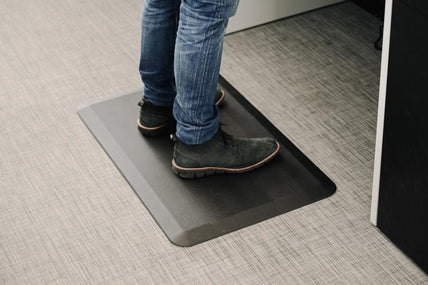How Stress Affects Your Body and Ways to Manage It
By Daniel Angelini on October 20, 2020Everyone experiences stress at one point in their life, as it’s the body’s natural response to a change in the environment. Even though it’s a common occurrence, stress can be problematic when we don’t understand the extent of the stress and what it’s doing to our bodies.
There are different kinds of stress. Good stress helps us survive and protect ourselves from physical harm and subsides once the stressor is gone. Meanwhile, bad stress is the response produced by the body even when there’s no grave threat, and it doesn’t ever really go away. This is also known as chronic stress, and its prolonged effects can seriously affect our physical and mental well-being.
How Stress Affects Your Body
Stress is processed through your autonomic nervous system. When your brain thinks there’s an impending physical threat, it floods your body with adrenaline and cortisol hormones. These substances are responsible for our natural “fight-or-flight” response, thus increasing our heart rate, blood pressure, and even blood sugar levels. Other non-essential functions that won’t immediately need to be used are shut down by the body.
In the face of serious danger, this response can be life-saving. However, when there’s nothing that’s actually putting us in harm’s way, this can produce a wide range of harmful effects on our minds and bodies, especially when this is prolonged.
For starters, stress makes our muscles contract, which stems the flow of blood. This constant tension will eventually lead to permanent constriction, which will lead to chronic back and neck pain. It can even lead to disorders like migraines, which can severely impact your quality of life and productivity.
It also impacts our respiratory system, making us take faster and shallower breaths. This restricts the amount of oxygen that flows through our brain and our body, which makes us feel more tired and sluggish. This limited breathing makes it difficult for those with respiratory issues, like asthma, to manage their symptoms.
Prolonged stress is known to cause strokes, heart attacks, and hypertension. This is because blood vessels dilate to escalate blood pressure while also raising our heart rate during the stress response. If this response continues, our cardiovascular system continues to overwork itself, causing these health conditions.
Stress can also cause chronic immune, metabolic, and mood disorders, like depression. This is because excessive stress has the capacity to interrupt the communication between the endocrine system and your brain. As the endocrine system is in charge of releasing hormones that are responsible for sleep, mood, metabolism, and for regulating the immune system, this effectively is compromised thanks to stress.
These are just a few of the ways stress affects the body, as it also wreaks havoc on our digestive and reproductive systems. It causes our body to go into overdrive in order for us to survive the perceived threat, but this much work on the body over a prolonged period will negatively impact us in more ways than we realise.
How to Manage Stress
Thankfully, it’s possible to manage our stress properly so that we successfully avoid overburdening our minds and bodies. While completely eliminating our stress response is impossible and unfeasible, managing it will help us stay happy and healthy despite rapid changes in the environment.
Prioritising Your Health: One of the most common causes of chronic stress is that we fail to attend to our health in order to fulfil other obligations, like work or school. However, if you don’t prioritise your health, your body might fail you, and you won’t be fit enough to fulfil the job you’ve ignored your body for!
Prioritising your health means a number of things: eating the right foods, exercising regularly, and getting good quality sleep every night. While it’s easy to sacrifice these things for other things, attending to these basics is integral for our well-being. It will also help you manage your stress much better.
Scheduling “Me” Time: Another reason many people feel stressed is that they feel guilty about spending any amount of time not being productive or working—but sometimes, doing nothing is actually good for your health!
Chronic stress means that your body’s muscles are tense and constricted, which you’ll have to undo in order to manage it properly. This means relaxing on a daily basis in order for your muscles—and your body—to hit the reset button. Relaxation means different things for different people: it could be taking long leisurely walks in your neighbourhood, listening to your favourite podcast, or even staying in bed and reading a book. Make sure to make time for relaxation every day to combat the effects of stress on your mind and body.
Asking for Help: Lastly, if you’re struggling with managing your stress, then don’t be afraid to seek help. Millions of people go through incredibly stressful situations and find relief once they’ve sought help. Many burdens shouldn’t be carried alone, and sharing them with loved ones can help you constructively deal with your stress.
Whether it’s seeking support from your spouse, family, friends, or a professional, asking for help is a surefire way to help you relieve stress. You’ll get a new perspective on your situation while learning more productive ways to manage stress.
Relieving Stress With a Standing Desk
There are also other ways to relieve stress that you can easily fit in your schedule. An incredibly common source of stress is our posture and the way we sit when we’re working. If we sit for too long, we risk extended neck and shoulder pain, increased weight gain, and even heart disease. After all, for those with an office job, you spend most of the day seated and sedentary.
Movement is crucial to keeping healthy and productive, which is why regular exercise is crucial to fighting physical and mental stress. Movement may not seem feasible especially if you’re working at a computer the entire day. However, with a standing desk, you’ll be able to regularly change posture and engage your muscles since you have the choice to sit, stand, and move all in one place.
In fact, standing desks have proven to increase productivity. Since you’ll be moving much more with a standing desk, your circulation, breathing capacity, and muscle engagement will all increase. You’ll also feel more relaxed and stretched since you’ll have moved your muscles more than you would have while seated.
Conclusion
Stress can be a challenge to overcome. If left unaddressed, it can lead to some serious health problems. Now that you know what happens to your body when you’re stressed and how to manage it, you’re one step closer to managing your stress and improving your overall mental and physical well-being. Using a standing desk is an effective way of combatting stress, and you’ll be able to work comfortably while subtly giving your body the movement it needs to function properly.
Are you hoping to relieve stress by switching to a standing desk setup? Check us out at Movi Workspace! We are a company in Australia that manufactures ergonomic and electric sit-stand desks to help you get the most out of your day. It offers better space, an automated lift, and smart features to help you work productively and more efficiently. Order yours today and get free shipping!










